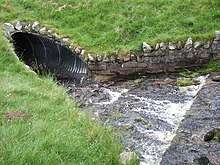culvert
English

Etymology
Obscure. A number of possibilities have been suggested: 1) a dialectical word; 2) a word related to the name of the now-forgotten inventor; 3) a derivation from Tamil கல்வெட்டு (kalveṭṭu, “inscription”) (கல் (kal, “stone”) + வெட்டு (veṭṭu, “cut”) cut stone), a Tamil term for a carved stone bridge allowing passage of a stream below; 4) a derivation of French couvert (“covered”), although couvert is not used in this sense and the French translation of culvert is "ponceau" or "buse de drainage"; and 5) a derivation from an unrecorded Dutch word, possibly *coul-vaart, equivalent to coul- from French -- compare couler (“to flow”) + vaart (“a trip by boat, a canal”).
Noun
culvert (plural culverts)
- A transverse channel under a road or railway for the draining of water.
- 1922, Virginia Woolf, Jacob's Room, Vintage Classics, paperback edition, page 91
- A raft of twigs stayed upon a stone, suddenly detached itself, and floated towards the culvert.
- 1996, Janette Turner Hospital, Oyster, Virago Press, paperback edition, page 167
- After she left, I ran away for a day, and hid myself, solitary, in a culvert under the railway lines.
- 1922, Virginia Woolf, Jacob's Room, Vintage Classics, paperback edition, page 91
Translations
Verb
culvert (third-person singular simple present culverts, present participle culverting, simple past and past participle culverted)
- To channel (a stream of water) through a culvert.
References
- culvert at OneLook Dictionary Search